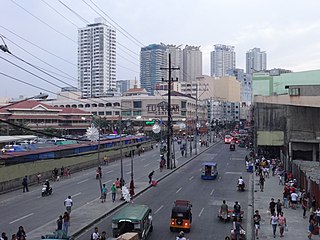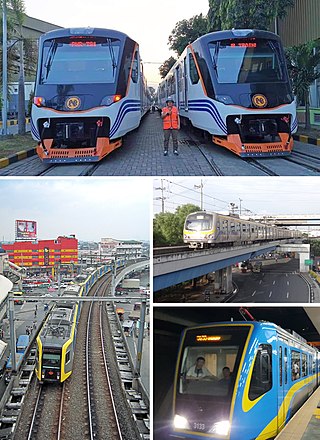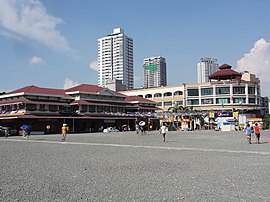
The Ayala Center is a 50-hectare (120-acre) mixed-use major commercial development operated by Ayala Land located in Barangay San Lorenzo within the Makati Central Business District in Makati, Metro Manila, Philippines. The complex comprises three shopping malls, three department stores, each with its own retail shops, restaurant arcades and cinemas, several hotels, eight residential towers, five office towers, four parking buildings, and leisure amenities such as the Greenbelt Park, Glorietta 3 Park, and the Ayala Museum, showcasing exhibits on Philippine history and art.

Glorietta, also known as Ayala Malls Glorietta, formerly known as Quad, is a shopping mall complex in the Ayala Center, Makati, Metro Manila, Philippines. The mall is owned by Ayala Land and operated through its subsidiary, the Ayala Malls. The mall is divided into five sections and contains many shops and restaurants, as well as cinemas, gyms, arcades and two central activity centers. Visitors have described the mall as maze-like, due to the complexity of its interior layout.

Divisoria is a commercial center in the districts of Tondo, Binondo, and San Nicolas in Manila, Philippines known for its shops that sell low-priced goods and its diverse manufacturing activities. Tutuban Center is situated within the commercial hub along with a night market located in the Centers' vicinity. The area is riddled with different bazaars, bargain malls, and a few points of interest.

Ayala Malls Trinoma is a large shopping mall in Quezon City, Philippines, owned by property development firm Ayala Land. Opened on May 16, 2007, the mall is located on the east side of Epifanio de los Santos Avenue in Quezon City, giving significant market competition to the nearby SM North EDSA as one of the largest malls in Metro Manila. It is also one of two malls that will be serving Ayala Land's Vertis North township, which is located beside the mall, along with a new lifestyle block mall Ayala Malls Vertis North, similar to Greenbelt in Makati, which was also developed by Ayala Malls.

SM City Cebu, is a large shopping mall located in Mabolo, Cebu City, Philippines. It is the 4th shopping mall owned and developed by SM Prime Holdings, the country's largest shopping mall owner and developer. It is the company's first shopping mall outside Metro Manila and the fifth largest shopping mall in the Philippines. It has a land area of 11.8 hectares and a gross floor area of 495,000 m2 (5,330,000 sq ft)

Greenbelt, also known as Ayala Malls Greenbelt, is a shopping mall located at Ayala Center, Makati, Metro Manila, Philippines. It is owned by Ayala Malls, a real-estate subsidiary of Ayala Land, which is an affiliate of Ayala Corporation. It opened in 1988 after merging existing structures and is one of the Ayala Corporation's flagship projects. The mall offers a mix of high-end retail shops, restaurants, amenities, leisure and entertainment. Currently, the mall has five sections: two enclosed areas, two buildings with open-air shopping areas, and Greenbelt 5, which was opened in 2007.

Market! Market! is a shopping mall complex developed by Ayala Land, the real estate subsidiary of Ayala Corporation, on a lot leased from Bases Conversion and Development Authority, a government-owned and controlled corporation. It is operated by its subsidiary, Ayala Malls. It is located at McKinley Parkway, Bonifacio Global City, Taguig, Metro Manila, Philippines. Groundbreaking was conducted in August 2002 and the mall opened on September 16, 2004. The mall caters to the middle market, unlike other Ayala malls, which cater to the upper socioeconomic class.

Paco station is a railway station located on the South Main Line in the city of Manila, Philippines. It was originally opened by the Manila Railroad Company in 1908 as a major hub in the southern half of Manila, where trains toward Cavite province once operated. The old train station building was designed by William E. Parsons and was completed in 1915. Prior to the electrification plan in the late 1970s, Paco was the southernmost double-track station on the line.

Alabang Town Center is a shopping lifestyle center located south of Metro Manila located next to gated residential communities and bustling business developments in Barangay Ayala Alabang, Muntinlupa. It is owned by Ayala Malls and is considered one of the oldest shopping malls owned and operated by Ayala Malls since it opened in 1982.

Tutuban station is the central railway terminus of the Philippine National Railways (PNR) network located in the city of Manila, Philippines.

Claro M. Recto Avenue, more popularly known as simply Recto, is the principal commercial thoroughfare in north-central Manila, Philippines. It spans six districts just north of the Pasig River in what is generally considered Manila's old downtown area.

Abad Santos Avenue is a major north–south arterial road located in the district of Tondo in northern Manila, Philippines. It is a divided roadway with four lanes in each direction running through the eastern edge of Tondo from the intersection with Rizal Avenue near the Manila Chinese Cemetery at its north end to Recto Avenue near the Tutuban railway station at the district boundary of Tondo and Binondo at the south.

The PNR Metro Commuter Line was a commuter rail line operated by the Philippine National Railways. It was first inaugurated as the Metro Manila Commuter Service in 1970, and originally served the North Main Line and the South Main Lines, as well as the defunct Carmona and Guadalupe branch lines. Since then, it adopted several names such as Metrotrak and Metrotren, before adopting its present name in the late 2000s. The line was also nicknamed the Orange Line due to its designation in the 1970s.
Tutuban station is a proposed Manila Light Rail Transit (LRT) station situated on Line 2. It is part of the Line 2 West Extension project, a 3.02-kilometer (1.88 mi) extension from Recto station to the Manila North Harbor in Tondo. The west extension project calls for the construction of three additional elevated stations: two on Recto Avenue and one on Zaragoza Street near Pier 4 of the Manila North Harbor. It was approved by the National Economic and Development Authority on May 19, 2015. Ayala Land Inc., will benefit the said station as they already acquired Tutuban Center. Future developments will soon progress at the area the same time with LRT Tutuban Station construction.

San Lazaro Tourism and Business Park is the marketing name given to the 16-hectare (40-acre) multiple use site under development by the Manila Jockey Club Investments Corp. in Manila, Philippines. It takes its name from the old San Lazaro Hippodrome, a horse racetrack that stood on the site from circa 1900 to 2003. Currently, the site includes the SM City San Lazaro shopping center, the two-tower Vertex office complex, the three-tower Celadon Park and Celadon Residences, and the five-tower Avida Towers San Lazaro condominium complex. It has been declared a tourism economic zone with information technology component in 2009.

The following is an alphabetical list of articles related to the Philippine capital region of Metro Manila.

The North–South Commuter Railway, also known as the Clark–Calamba Railway, is a 147-kilometer (91-mile) commuter rail system under construction on the island of Luzon in the Philippines. Running from New Clark City in Capas, Tarlac, to Calamba, Laguna, with 36 stations and four services, the railway is designed to improve connectivity within the Greater Manila Area and will be integrated with the railway network in the region.

Rail transportation in the Greater Manila Area is a major part of the transportation system in Metro Manila and its surrounding areas. The railway network, collectively known as the Greater Capital Region Railway System, consists of the Manila Light Rail Transit System (LRT), Manila Metro Rail Transit System (MRT), and Philippine National Railways lines within the region.

One Ayala, also known as One Ayala Avenue (OAA), is a mixed-use development developed by Ayala Land located at Ayala Center via EDSA (C-4) in Makati, Metro Manila, Philippines. It is located across Glorietta mall and occupies the former InterContinental Manila and EDSA Carpark sites. It aims to combine retail, hotel, and office facilities in a single contiguous space. Construction began in 2016 with the demolition of InterContinental Manila and EDSA Carpark and parts of the development opened in 2022.






















